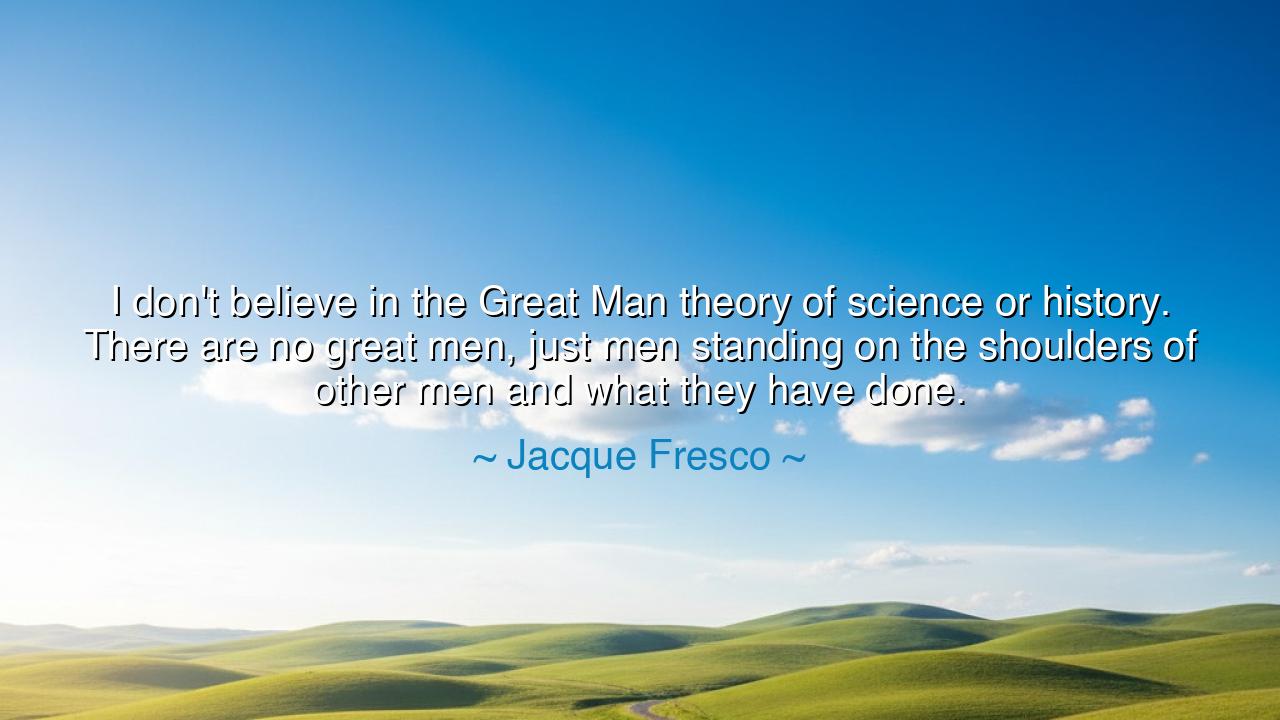
I don't believe in the Great Man theory of science or history.
I don't believe in the Great Man theory of science or history. There are no great men, just men standing on the shoulders of other men and what they have done.






“I don’t believe in the Great Man theory of science or history. There are no great men, just men standing on the shoulders of other men and what they have done.” Thus spoke Jacque Fresco, the visionary engineer and futurist who dreamed of a world guided not by wealth or ego, but by reason and cooperation. His words, humble yet profound, strike at the heart of human arrogance — for they remind us that greatness is not the work of one, but of many, not the lightning of genius in isolation, but the long, unseen chain of minds and hands that forge civilization itself. Fresco’s wisdom is a river flowing through time, carrying with it the truth that all progress is a shared inheritance, and that no soul, however brilliant, stands entirely alone.
The Great Man theory, once popular among historians, claimed that the course of history was shaped by singular, extraordinary individuals — heroes, conquerors, or geniuses whose strength or insight alone changed the fate of nations. Fresco rejected this notion, seeing it as a myth that blinded humanity to its true nature. He saw that every so-called “great man” — be he scientist, leader, or artist — was but the fruit of a vast and ancient tree whose roots reached into countless other lives. Ideas are not born in a vacuum; they rise from the soil of collective knowledge, watered by the labor of generations. Even the brightest star shines only because of the firmament that surrounds it.
Consider the story of Isaac Newton, who once said with humility, “If I have seen further, it is by standing on the shoulders of giants.” Newton, celebrated as one of the greatest scientists in history, understood the truth that Fresco later voiced: that his discoveries were not conjured from the void, but built upon the work of Kepler, Galileo, Descartes, and the countless unnamed thinkers who came before. Without their questions, he could not have found his answers. Without their courage to seek truth in a world that punished inquiry, his own courage would have been meaningless. Thus, Newton’s genius was not solitary but symbiotic — an illumination made possible by the fires others had kindled before him.
Fresco’s words echo this same humility but extend it beyond the realm of science into the story of all human progress. He saw that history itself — with all its empires, inventions, and revolutions — is not written by great men, but by the invisible hands of ordinary people who build, toil, and dream. Behind every general’s triumph stands the soldier; behind every inventor’s creation stands the craftsman; behind every leader’s vision stand the nameless millions who live, love, and labor in the quiet spaces of time. The true greatness of humanity lies not in the individual hero but in the collective spirit — the long, unbroken chain of collaboration and continuity.
Think of the building of the cathedrals of Europe, those vast sanctuaries of stone and light that seem to touch the heavens. No single man could claim their creation. They were built by generations — stonemasons who would never see the spire completed, artisans whose names have been forgotten, architects who died before their visions were fulfilled. Yet together, across centuries, they built monuments that outlived kings. This is the truth of Fresco’s teaching: that enduring beauty and progress are not the triumphs of one, but of many united in purpose, each standing on the shoulders of those who came before.
In his life’s work, Fresco envisioned The Venus Project, a blueprint for a society guided by cooperation rather than competition, by shared intelligence rather than the illusion of solitary greatness. He believed that recognizing our interdependence was the key to transcending the greed and conflict that have so often divided us. The myth of the “Great Man” feeds the ego and isolates the soul; the truth of collective genius humbles the spirit and binds us together. It reminds us that every mind, no matter how small its contribution, is part of the grand tapestry of human advancement.
So, my child of the future, when you look upon the achievements of humankind — the soaring bridges, the symphonies, the discoveries that push back the night — do not see them as the works of heroes alone. See them as the inheritance of countless lives, each adding a thread to the fabric of progress. Do not seek to be a “great man,” but a good contributor; do not strive to stand above others, but to stand upon the wisdom they have built and raise it higher still. For the mark of true greatness is not to shine alone, but to kindle the light in others — that they too may see further, and build a future worthy of all who came before.
Remember always what Jacque Fresco taught: that greatness is not a crown, but a continuum — not a monument of one, but a movement of many. To understand this is to find both humility and power: the humility to know you are one among billions, and the power to know that, through unity, you are infinite.






AAdministratorAdministrator
Welcome, honored guests. Please leave a comment, we will respond soon